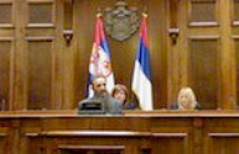National Assembly of the Republic of Serbia / Activities / Activity details

Wednesday, 1 November 2006
14th sitting of the Children’s Rights Sub-Committee
On 1 November, the Children’s Rights Sub-Committee held its fourteenth sitting, in the form of a roundtable devoted to violence against children.
On 1 November, the Children’s Rights Sub-Committee held its fourteenth sitting, in the form of a roundtable devoted to violence against children.
The sitting was opened by Zivodarka Dacin, Sub-Committee chairperson. She welcomed the Chairman of the National Assembly, the deputies, Government Ministers, foreign diplomats, NGO officials, and, particularly, journalists present, and thanked them for positive coverage of the issues handled by the Sub-Committee.
She underlined that violence against children existed in all countries, especially those that had seen wars, where children lived as refugees or displaced persons. The greatest problem is that these children are ‘invisible’, which means that society must do all it can to make their issues visible, Ms Dacin said.
She recalled the Sub-Committee’s legislative activities undertaken since its formation, and expressed her pleasure at the fact that the members had taken part in drafting the Draft Children’s Rights Bill. Roundtables on inclusive education had also been organised. Ms Dacin added that the deputies supported the motion for the Children’s Rights Sub-Committee to grow into a full Committee, which would contribute to its efficiency.
The attendees were also welcomed by the Chairman of the National Assembly, Predrag Markovic, who said that it was ‘crucial for the entire society, all segments, to take part in combating violence against children. The majority of the society’s segments are represented at Assembly House, the nation’s highest legislative and only constituent body, and it is here that we should hear from each other, agree, and remind ourselves of everything – both good and bad – that has been done.’ He reiterated that the National Assembly had adopted and signed several documents, and that the Draft Children’s Rights Bill had entered Assembly procedure.
Mr Markovic emphasised the problem of the visibility and recognition of the abuse of children’s rights and violence against children, all the more so since it was happening inside closed environments that are supposed to protect children. ‘All levels need to be involved in recognising violence: schools, kindergartens, the parents, the media’, said Markovic, adding the warning that children accepted the world around themselves as something natural, as a defence mechanism, which is why they tend to copy models of behaviour for which adults are responsible.
The National Assembly chairman invited those present to each do what they could so that the entire society could stamp out the constant threat of violence.
The Minister of Education and Sports, Slobodan Vuksanovic, informed those present of practical activities taken to protect children taken over the past two years. A Prevention Council was initially formed at the Ministry of Education; this body organised a number of seminars, primarily in larger cities, while many publications dealing with violence against children were issued. In co-operation with the
Mr Vuksanovic told the meeting about events held to counter violence against children, such as the ‘Love and Tolerance March’, ‘Love and Tolerance Class’, and ‘Where Is Your Child Now?’
Ann-Lis Svensson, UNICEF Director for
The Minister of Health and Chairman of the Children’s Rights Council, Tomica Milosavljevic, spoke of regional consultations for the prevention of violence against children, and the 2004 National Action Plan for Children. He said that protecting children was one of
Save the Children Country Manager Simon Burdett said that violence against children was a universal problem; he presented disturbing data about the number of children facing verbal and physical humiliation and sexual abuse, those witnessing violence in the family, children being treated for or dying from consequences of violence, as well as falling prey to human trafficking. He singled out as special issues physical violence and humiliating punishments, emotional violence, and the problem of children in conflict with the law.
The attendees were also addressed by Marija Brdjovic and Zeljko Antic, who had taken part in drafting the Study in Children’s Words, compiled in parallel with the official Study.

